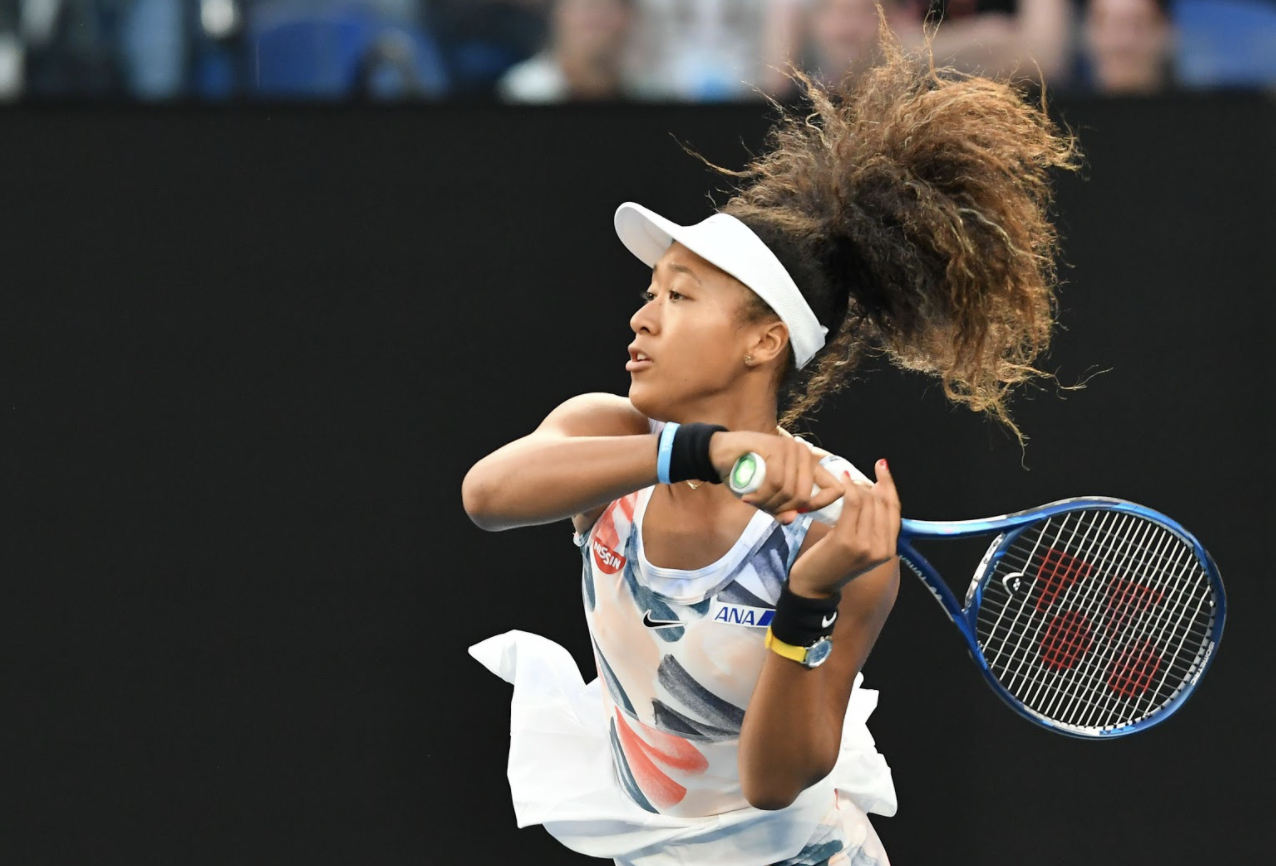By Ariel Neidermeier
Naomi Osaka in action at the Australian Open 2020. Photo credit: csm/Alamy Live News
Four-time Grand Slam singles champion. Reigning champion at the US Open and Australian Open. The first Asian player to be ranked No. 1 by the Women’s Tennis Association. The first Japanese-born player to win a Grand Slam title.
In light of all these achievements, it’s hard to imagine that Naomi Osaka would become best known for her rise as the face of athlete mental health following her withdrawal from the French Open in June 2021. But beyond a resonance amongst just athletes, Osaka’s story represents the stories of so many women in professional spaces calling out for mental health support.
After declining the news conference following her first-round French Open victory, Osaka was fined $15,000. She would go on to withdraw from the French Open completely, citing mental health issues. Since the incident, the 23-year-old mixed-race, Japanese and Haitian professional tennis player opened up about her stance on athlete mental health in a Time Magazine article titled, “It's O.K. Not to Be O.K.” A Netflix docuseries released mid-July, titled “Naomi Osaka,” adds further context to the events, by exploring the loneliness and self-discovery of Osaka’s early career.
Mental Health in America in 2021
As the COVID-19 pandemic relentlessly persists, we are seeing the highest levels of anxiety and depression in the U.S. on record. In its 2021 State of Mental Health in America Report, Mental Health America (MHA) reported that today, 19% (47.1 million) of people in the U.S. live with a mental health condition. This represents a 1.5 million increase from 2020. Within this, alarming numbers of young people are reporting thoughts of suicide and self-harm, with 9.7% of youth in the U.S. reporting severe depression. For youth who identify as more than one race, like Osaka, that rate increases to 12.4%.
Osaka acknowledged the effect of the social, political and economic tumult of the last few years on her own mental well-being to Time:
“The world is as divided now as I can remember in my short 23 years... So, when I said I needed to miss French Open press conferences to take care of myself mentally, I should have been prepared for what unfolded.”
What unfolded was a chilling reminder of the lack of understanding and under-resourcing of the mental health needs of not just professional athletes but of many women as well.
Get Your Head In the Game
Tennis has always been known to be a mental game. Ask any competitive tennis player who their greatest opponent is and they will name themselves. The top players in tennis win matches because of a strong mental game. Even a top ranked player can lose to an average player if their head is not in the game.
In tennis - as in life - winning does not just depend on physical strength but on strategic ability. Tennis players are trained to read their opponent, sharpen the ability to predict their competitor’s next move, exploit their frustrations and, ultimately, demobilize their game play from the inside-out.
Similarly, in patriarchy, women must stretch themselves strategically to survive - and thrive - in a society in which the odds are often stacked against them. Women are twice as likely than men to be diagnosed with depression. Whether this discrepancy is due to more women seeking diagnosis or not, as with many aspects of society, when it comes to mental illness, women seem to suffer more.
The Business of Doing It All
Osaka’s profession of being a top ranked athlete is flush with intense media scrutiny and difficulty switching from “match mode” to “social mode” in a quick few minutes, as players have to turn off the ruthlessness they hold on the court and put on a pretty face for the media immediately after.
This echoes the switching costs that so many women note can negatively impact their mental health: going from hard-driving career woman fighting to compete in the workplace to nurturing mother and present partner immediately after. The feminist movement has long discussed the possibility of women “having it all,” only to discover that having it all meant doing it all - work life, family life, married life - stretching women even further and stacking the odds ever higher.
From this standpoint, perhaps Osaka’s most courageous achievement in her interaction with the French Open was simply stating publicly that “It’s O.K. not to be O.K.”
It’s O.K. Not To Be O.K.
In her discussion of possible solutions to the mental and emotional strains tennis players face, Osaka practically noted the benefits of simply giving athletes the ability to take a break when they need one:
“I have numerous suggestions to offer the tennis hierarchy, but my No. 1 suggestion would be to allow a small number of “sick days” per year where you are excused from your press commitments without having to disclose your personal reasons.”
In the same way, if we seek to confront the fact that women, on average, suffer more from mental illness than men do, we should give the same ability to women. That is, give women, female-identifying and gender non-conforming individuals the permission to ask for more support - without stigmatization, judgment, penalty, or the provision of more detail - when they need it.





